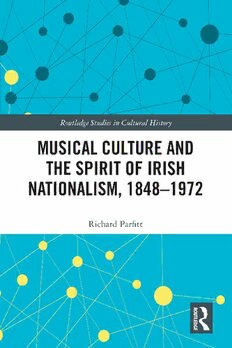
Musical Culture and the Spirit of Irish Nationalism, 1848–1972 PDF
Preview Musical Culture and the Spirit of Irish Nationalism, 1848–1972
Musical Culture and the Spirit of Irish Nationalism, 1848–1972 Musical Culture and the Spirit of Irish Nationalism is the first comprehensive history of music’s relationship with Irish nationalist politics. Addressing rebel songs, traditional music and dance, national anthems and protest song, the book draws upon an unprecedented volume of material to explore music’s role in cultural and political nationalism in modern Ireland. From the nineteenth-century Young Irelanders, the Fenians, the Home Rule movement, Sinn Féin and the Anglo-Irish War to establishment politics in independent Ireland and civil rights protests in Northern Ireland, this wide- ranging survey considers music’s importance and its limitations across a variety of political movements. Richard Parfitt , based at the University of Oxford, is a historian of political music and culture in the nineteenth and twentieth centuries. Routledge Studies in Cultural History Children and Globalization Multidisciplinary Perspectives Edited by Hoda Mahmoudi and Steven Mintz A History of Shaolin Buddhism, Kung Fu and Identity Lu Zhouxiang Heroism as a Global Phenomenon in Contemporary Culture Edited by Barbara Korte, Simon Wendt and Nicole Falkenhayner The Body in History, Culture, and the Arts Edited by Justyna Jajszczok and Aleksandra Musiał The Greening of the City Urban Parks and Public Leisure, 1840–1939 Carole A. O’Reilly Aboriginal Protection and Its Intermediaries in Britain’s Antipodean Colonies Edited by Samuel Furphy and Amanda Nettelbeck Revolutionary Ukraine, 1917–2017 History’s Flashpoints and Today’s Memory Wars Myroslav Shkandrij Post-Soviet Nostalgia Confronting the Empire’s Legacies Edited by Otto Boele, Boris Noordenbos and Ksenia Robbe Musical Culture and the Spirit of Irish Nationalism, 1848–1972 Richard Parfitt For more information about this series, please visit: h ttps://www.routledge. com/Routledge-Studies-in-Cultural-History/book-series/SE0367 Musical Culture and the Spirit of Irish Nationalism, 1848–1972 Richard Parfitt First published 2020 by Routledge 52 Vanderbilt Avenue, New York, NY 10017 and by Routledge 2 Park Square, Milton Park, Abingdon, Oxon, OX14 4RN Routledge is an imprint of the Taylor & Francis Group, an informa business © 2020 Taylor & Francis The right of Richard Parfitt to be identified as author of this work has been asserted in accordance with sections 77 and 78 of the Copyright, Designs and Patents Act 1988. All rights reserved. No part of this book may be reprinted or reproduced or utilised in any form or by any electronic, mechanical, or other means, now known or hereafter invented, including photocopying and recording, or in any information storage or retrieval system, without permission in writing from the publishers. Trademark notice : Product or corporate names may be trademarks or registered trademarks, and are used only for identification and explanation without intent to infringe. Library of Congress Cataloging-in-Publication Data Names: Parfitt, Richard, 1990– author. Title: Musical culture and the spirit of Irish nationalism, 1848–1972 / By Richard Parfitt. Description: New York : Routledge, 2020. | Series: Routledge studies in cultural history | Includes bibliographical references and index. | Identifiers: LCCN 2019021689 (print) | LCCN 2019021878 (ebook) | ISBN 9780429325540 () | ISBN 9780367344009 Subjects: LCSH: Music—Political aspects—Ireland—History. | Music—Political aspects—Northern Ireland—History. | Nationalism in music. Classification: LCC ML3917.I74 (ebook) | LCC ML3917.I74 P37 2020 (print) | DDC 781.5/9909415—dc23 LC record available at https://lccn.loc.gov/2019021689 ISBN: 978-0-367-34400-9 (hbk) ISBN: 978-0-429-32554-0 (ebk) Typeset in Sabon by Apex CoVantage LLC For Claire Contents List of Figures ix Acknowledgements x List of Abbreviations xii Introduction: “Ballads Have Long Lost Their Revolutionary Powers” 1 PART 1 Nationalism, 1848–1913 21 1 “Oh, What Matter, When for Erin Dear We Fall?”: Fenianism, Radical Nationalism and the Irish Soundscape 23 2 Appropriating Radicalism: Nationalist Music and Home Rule 38 3 Gaelicising “The Seonín Maids of Eirinn”: The Politics of Ireland’s Musical Revivals 47 PART 2 Revolution, 1913–1923 57 4 “Great Men and Straight Men”?: Music, Radicalisation and Revolution, 1913–1921 59 5 “Oh, How We Worship Our Dora”: Seditious Singing and British Laws 80 6 “We Thought We Fought for Ireland”: Music and the Civil War 86 viii Contents PART 3 Independence, 1923–1972 97 7 “Three-Quarters of a Nation Once Again”: Music and Party Politics 99 8 “Folk Music Alone Will Not Supply Our Needs”: Music and Cultural Nationalism 118 PART 4 Partition, 1923–1972 137 9 “This Morning a Man Was Hanged. This Evening We Had a Concert”: Music, Nationalism and Northern Ireland, 1923–1967 139 10 “For the Most Part We Played Rebel Songs”: Music and Civil Rights 157 11 “Ireland for the Irish, We Shall Not Be Moved”: Music and the Troubles 167 PART 5 Dance 175 12 Inventing the Irish Dancer, 1848–1923 177 13 “Jazzing the Soul of the Nation Away”: Dance and Dissent, 1923–1935 190 14 Modernising Irish Dance, 1935–1972 203 Conclusion: Nationalist Communities, Revolution and Musical Mischief 215 Bibliography 218 Discography 272 Filmography 275 Index 276 Figures 4.1 The St James’s Band Plays at Jeremiah O’Donovan Rossa’s Funeral, 1915 70 4.2 The Ballykinlar No. 1 Camp Violin Class 75 6.1 Constance Markievicz, ‘These Were the Songs of Irish Ireland’, c. 1922 93 14.1 West Cork Ballad—The Fiddler and the Shopkeeper’s Daughter 209 14.2 Dancers Domy Reiter-Soffer and Julia Cotter in West Cork Ballad as the Fiddler and Shopkeeper’s Daughter 211
